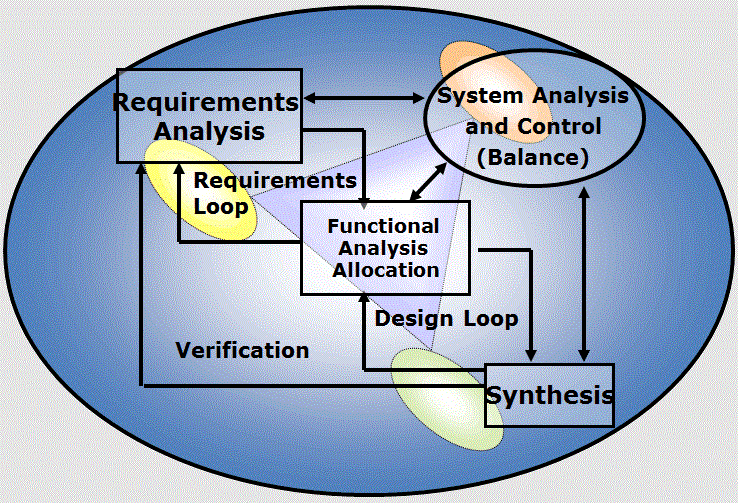In today's environment, complex aerospace systems are commonly integrated with a variety of other information,
transportation, freight, and service systems. Modern aircraft, spacecraft, satellites, and launch systems all are
expected to operate flawlessly with government and civil systems to provide exceptional user service levels. In addition
to flawless operation, buyers, operators and users anticipate that aerospace products provide high reliability, long life,
low cost, and ease of use. From satellite television to GPS-driven aids in transportation and communication, real-time global
interdependent systems are the norm. The unrelenting increase in demand for these systems over the past several decades has
spawned the discipline of Systems Engineering, a relatively new engineering approach designed to cope with these complexities.

General Systems Engineering Process Loop
Aerospace Engineering at the University of Illinois at Urbana-Champaign offers the newly formed professional non-thesis master's program
in Aerospace Systems Engineering. The program focuses on systems thinking and the application of these techniques in developing aerospace
systems from the initial needs identification to the total system integration. Students are exposed to requirements development, concepts
of operations definition, functional analysis, product and functional hierarchies, interface identification, "design-to" requirements, system
trade studies, retaining design integrity, and decision analysis in systems-of-systems and family-of-systems environments.
Students are encouraged to define their own strategies to solutions using system engineering approaches and methods in an
indeterminate solution space.
A heuristic view of the aerospace product, processes, and enterprise is desirable whether one works in one of the many systems engineering areas or one of the core science areas such as structures, aerodynamics, or propulsion. An understanding of the holistic nature of complex systems is necessary to adequately tailor and optimize products for a particular use. This understanding allows engineers to realize their individual products' contributions to the entire system while enhancing the engineers' value to prospective employers.
A heuristic view of the aerospace product, processes, and enterprise is desirable whether one works in one of the many systems engineering areas or one of the core science areas such as structures, aerodynamics, or propulsion. An understanding of the holistic nature of complex systems is necessary to adequately tailor and optimize products for a particular use. This understanding allows engineers to realize their individual products' contributions to the entire system while enhancing the engineers' value to prospective employers.
- Systems Engineers are responsible for requirements development, architectural definition, operational modeling, simulation of potential systems, design, and verification. They also are responsible for manufacturing methods and assembly and testing of products in development.
- Systems engineers take charge of many of the "specialty fields" in aerospace, including reliability, maintainability, supportability, safety, human factors, and environmental analysis. Systems engineers are also needed in the fields of information assurance, networks, sensors, and software.
- System-of-systems architects are specialists in Systems Engineering. These engineers keep systems tied together and operating as a single unified element.